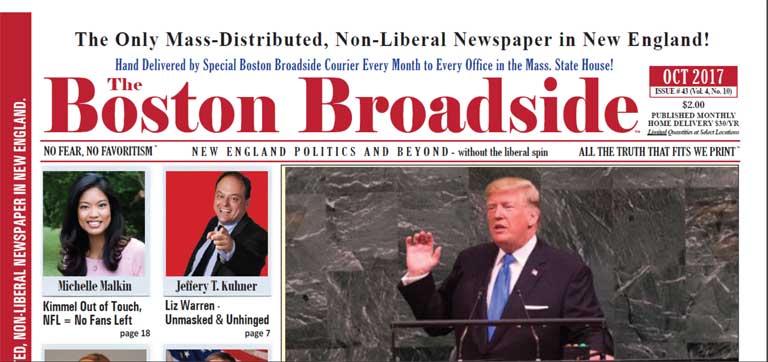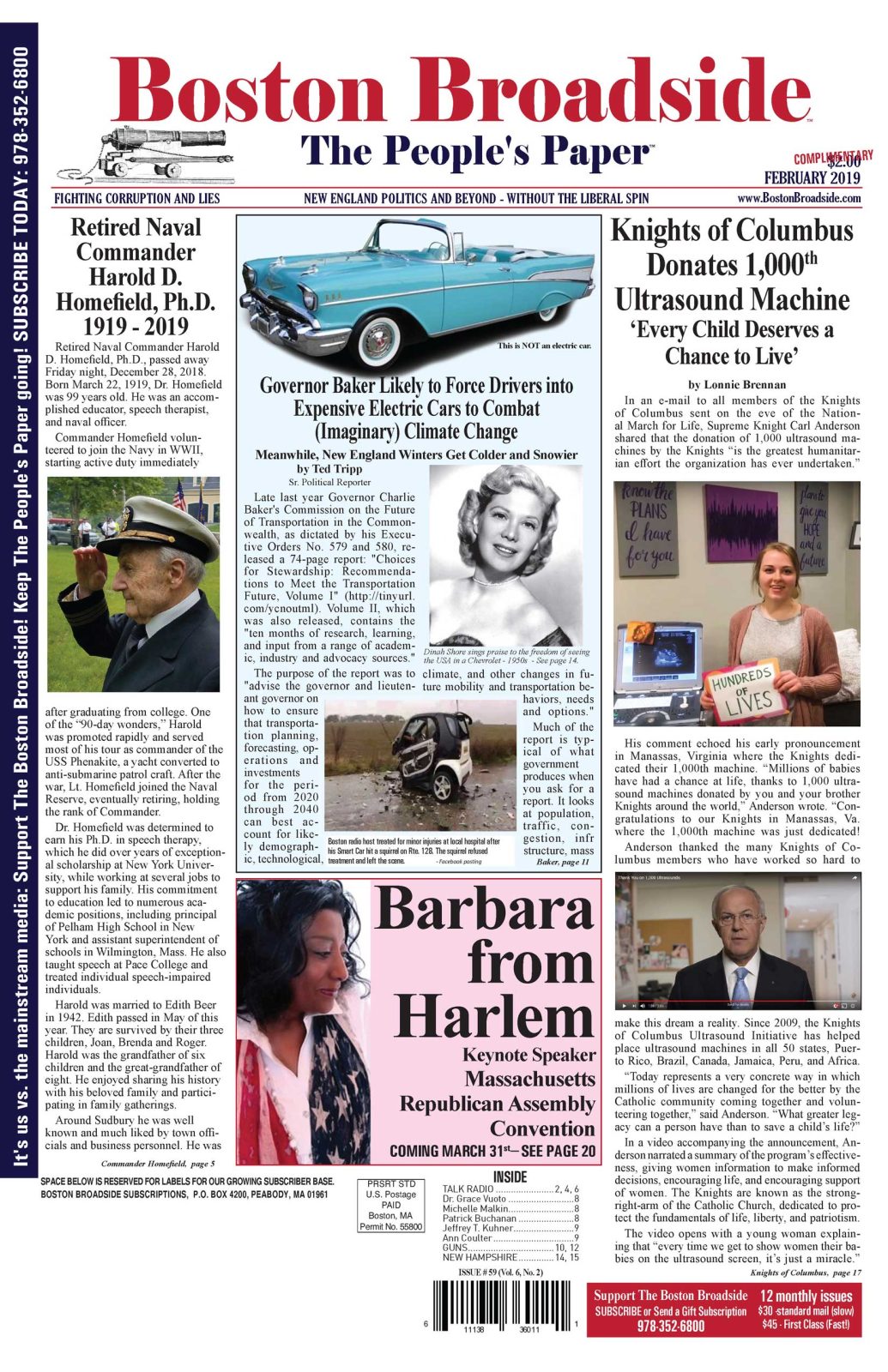What Could Possibly Go Wrong?
by Ted Tripp
Political Reporter
Let’s start with: Are you a “distressed person” or do you know a “distressed person”? This is not a trick question or even a frivolous question. Be careful how you answer as it may directly affect your Second Amendment rights to keep a firearm and your other constitutional rights to private property and unreasonable searches. Your life or a friend’s life could also be in danger
What? Some background is in order here for you to understand the importance of the question. In 2014 the Massachusetts Legislature passed H.4376 and Governor Deval Patrick signed it into law on August 11, 2014 to become M.G.L., Chapter 284, an Act Relative to the Reduction of Gun Violence (http://tinyurl.com/hmxa9yz). The new law has 112 Sections and is immensely complicated. Whether or not all these words and paragraphs will have any effect on criminals committing crimes with guns is yet to be determined. People still rob banks though we have many strong laws against it.
I want to focus on Section 100 of the new law. This establishes a Task Force to study and report on “suitable and feasible options for the safekeeping of a distressed person’s firearms in a location away from the household.” This is a proactive attempt by state government to keep firearms away from mentally unbalanced individuals who have access to them and may be dangerous. While the language doesn’t specifically say so, it implies that someone will come and take your guns away if you are designated distressed.
The Task Force is comprised of: the secretary of the Executive Office of Public Safety and Security, or a designee; the commissioner of public health, or a designee; a person from the Gun Owners’ Action League (GOAL); a person from the Mass. Chiefs of Police Association; a person from the committee for public counsel services; a person from the National Alliance on Mental Illness of Mass.; and a person from the Mass. District Attorneys Association.
The results of the Task Force study, along with drafts of any proposed legislation, were to be reported to the clerks of the Legislature by July 31, 2015.
The Task Force has come up with a draft for new legislation, called Chapter 140, Section 129E, Temporary Seizure of Firearms, Ammunition and Other Dangerous Items from Distressed Persons. It is not yet a bill.
The draft has this chilling and overly broad definition of a distressed person: “an individual, whether or not he or she is the holder of a License to Carry or a Firearms Identification Card, who by virtue of mental or emotional instability, dementia or other neurological condition, or use of drugs, alcohol, or other psychoactive substances, reasonably appears to lack the capacity to safely keep and possess a weapon or ammunition, such that the safety of that individual or others is threatened.”
What defines emotional stability? Do a few beers a day or two glasses of wine make you a distressed person? A senior citizen who forgets where he leaves his keys – is that dementia or a neurological condition that makes him unsafe? I could go on and on…
Now here is the scary part of the proposed law:
“b) Any person who, in good faith, conceals or carries away a firearm, rifle, shotgun, machine gun, assault weapon, large capacity weapon, large capacity feeding device, or ammunition, …; a covert weapon … ; any weapon the possession of which is prohibited by the terms of G.L.c.269, § 10(b); or any other item which is inherently dangerous; in order to prevent the availability of such an item to a party he or she reasonably believes to be a distressed person, shall not be prosecuted for the larceny of such item or the criminal possession or carrying of such item, or the improper storage of such item, and shall not be civilly liable for such acts; provided that, as soon as is safely practicable, and in any case within 24 hours, the party taking possession of the aforementioned item notifies the Massachusetts State Police or a municipal police department, arranges for law enforcement to take physical custody of the weapon, and provides a sworn written statement regarding the taking or concealment of the item, the identity and location of the prior possessor, and the nature and circumstances which led to the party’s conclusion that the prior possessor was a distressed person.”
Wow! This essentially means that anybody – a family member, a neighbor or even a radical anti-gun nut – can legally break into your home and take away your guns if he or she thinks you are too dangerous to have them. All the gun confiscators have to do is show the police that they “reasonably believed” the gun owner was a distressed person. And if your guns are taken, how easy do you think it will be to convince the authorities that you are not distressed and the guns will be immediately returned? Don’t hold your breath.
Let’s look at some potentially very real and very bad situations.
Say you are a legal gun owner and at work. At the end of your street an anti-gun neighbor thinks you are dangerous because he thinks you drink too much beer, are arrogant and have a Tea Party flag flying in front of your house. He gets his buddy from across the street and they go into your house to confiscate your guns under the new law. What they don’t know is that your teenage daughter has come home early from school and is resting in her upstairs bedroom. She has also been taught how to responsibly use firearms. As the two would-be confiscators come in through a window, or break-in, the daughter hears the intruders and grabs one of your guns and hides in a closet. She hears the two men talking about taking guns. One of them opens the closet door and the frightened girl shoots and kills him. Who is at fault?
Here is another similar scenario. This time there is nobody home; the confiscators are in the home and have found the guns. At that instant the homeowner, who has a license to carry, shows up at the house. He confronts the intruders who are now holding guns and, feeling threatened, he shoots and kills one of them before realizing what is happening. Again, who is at fault? Or does it matter at this point with one dead…
What happens if the well-meaning confiscators, while in the process of collecting the firearms, accidentally shoot each other or themselves? Who is liable? The gun owner?
Let’s say the confiscators have safely taken the weapons out of the house back to their car. Now they drive off, but stop to check on a friend or get a bite to eat. While they are away from the car, it is stolen with the guns in it. Who is now responsible for putting these guns in the hands of criminals? The gun owner? Anybody? Again, does it matter, since the situation is now far worse off than if the guns were never confiscated?
Let’s say the confiscators, while breaking into your home and gun case, cause several thousand dollars in damage. Who is responsible? Will insurance pay?
You can see there are a lot more questions without answers and some situations where the consequences of enacting this kind of legislation have not been properly thought through.
Heaven help us if any of this foolishness becomes law.



